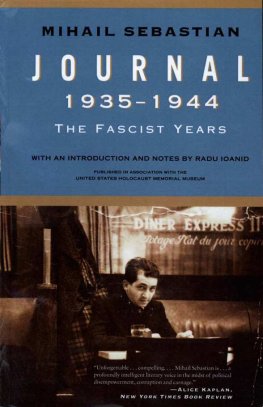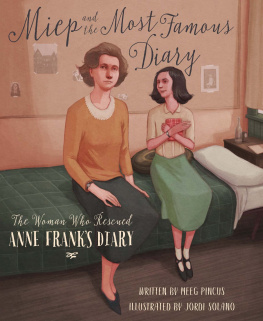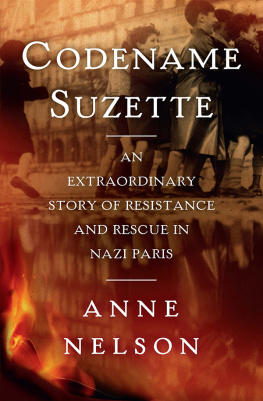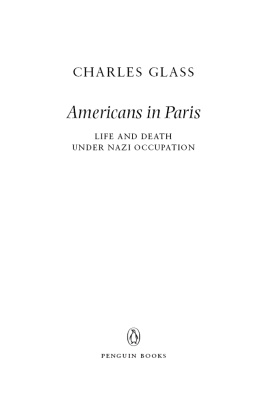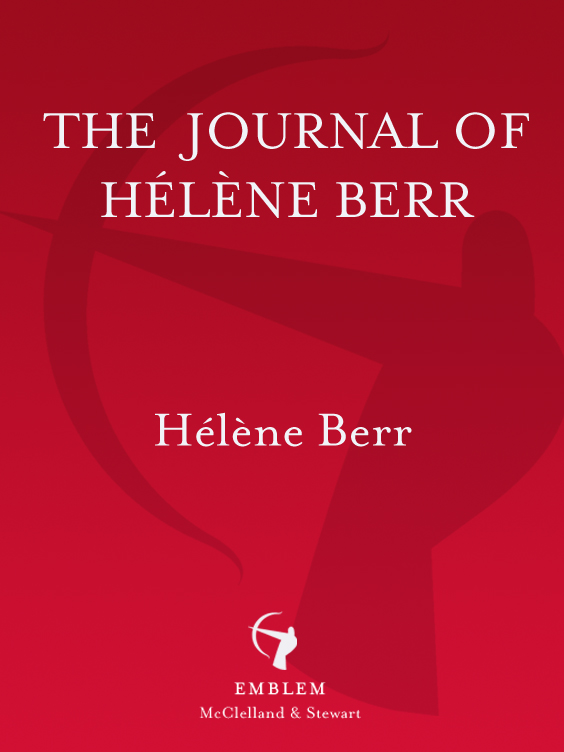INTERNATIONAL ACCLAIM FOR
The Journal of Hlne Berr
Reading The Journal of Hlne Berr, a diary of denial, heartbreak, and resistance that her familys cook passed on to surviving relatives after Hlnes death at Bergen-Belsen, is like watching a sunset: an inevitable, achingly vivid journey into the dark.
O, The Oprah Magazine
This was a woman whose appetite for life leaps from the page. Exceptional.
The Telegraph
As the Nazi regime cracks down, forcing Ms. Berr and other Jews to restrict their movements and wear the yellow star, her entries become a startling and moving eyewitness account of the persecution.
Globe and Mail
A searing record a moving self-portrait of a passionate young Jewish Frenchwoman who tried to aid her people and carry on her life with dignity.
Publishers Weekly
Remarkable. Comparisons with the diary of Anne Frank are inescapable But this diary is also an exceptional portrait of Paris during the bleakest years of the occupation, and a testimonial to how well and bravely many perfectly ordinary French citizens behaved.
The Spectator
We seem to understand for the first time the horror and absurdity Jews had to face every day in occupied Paris.
Libration
Books that detail everyday life during the dark hours are rare The document that Hlne Berr has left behind should be read by everyone A testimony of rare power.
Figaro
This is a voice and a presence that will stay with us for the rest of our lives.
Patrick Modiano, winner of the Prix Goncourt
A soul-clutching account With piercing honesty and a novelists eye, Hlne Berr allows us to follow her as she falls in love, struggles courageously to save orphaned children, and comes to terms with her own inevitable fate. You will not soon forget her voice or her haunting story.
Neal Bascomb, author of Hunting Eichmann
As extraordinary a document of occupied France as Irne Nmirovskys Suite Franaise.
Publishers Weekly (starred review)
A chilling record.
Washington Post
Unflinching [This journal] can indeed be compared to other great works of witness such as Anne Franks Diary of a Young Girl. But it should also be viewed as one of a kind, a unique testament That her words have survived is a poignant cause for celebration.
Ottawa Citizen
A work of exceptional literary quality, and a powerful historical document.
Simone Veil, LExpress
A truly great book Each entry provides a rare portrait of what it was like for such terrible things to happen to ordinary human beings Nevertheless, an extraordinary thread of hope in goodness, in humanity runs through her journal.
The Guardian
Hlnes answer to the question of deportation is one of the most poignant we may ever read.
Le Monde
Intimate and harrowing Deeply moving.
Belfast Telegraph
Breathtaking Most touching of all, [Berr] worries not about what will happen to her, but how others will be affected if she does not keep from them her shock and panic at the unspeakable torture she witnesses. This book is a must for anyone interested in the personal forces of history and who loves a riveting read.
Lucinda Franks, author of My Fathers Secret War
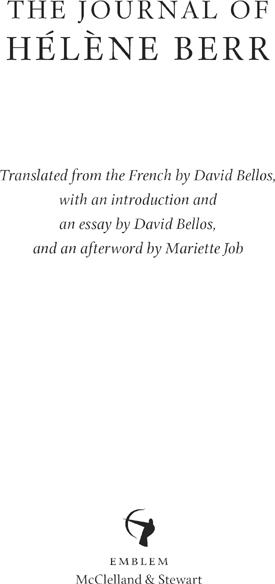
Contents
Introduction
DAVID BELLOS
This remarkable book is not a novel. It is a personal diary, not intended for publication, and, like any private document, it is occasionally enigmatic. Written by a passionate, intelligent and musically gifted woman of twenty-one from a cultivated and prominent French family, it is, to begin with, just a diary. Hlne tries to analyze her feelings for one young man, Grard, whose background is similar to her own, then slowly realizes that she has fallen in love with another, the handsome Jean Morawiecki.
Hlne began her Journal in the spring of 1942. Despite nearly two years of German occupation, life among the lite of French youth seemed almost unchanged, at least on the surface. Up to that time Hlne had not wanted to admit even to herself that the persecution of Jews was affecting her. As spring turned to summer, however, increasingly flagrant acts of oppression opened her eyes to reality. Her personal diary becomes a precious, horrified and horrifying eyewitness account of the means by which the Nazis Final Solution to the Jewish Question was implemented in France.
Hlnes rich and busy life moved between four overlapping sets of people. She had a crowd of student friends in the English Studies Department at the Sorbonne (some of them went by nicknames borrowed from their favourite books or authors: Sparkenbroke, Charlotte Bront, Lancelot of the Lake). Secondly, she played the violin in a group of gifted amateur musicians, one of whom was Grards father, a high-court judge. In her own comfortable home in avenue Elise-Reclus, Hlne lived with her older sister Denise and their two parents (as well as the domestic staff). During the summer months they often took the half-hour train ride from Gare Saint-Lazare to the familys country seat at Aubergenville, usually with friends and relatives in tow. Hlnes fourth circle centred on her maternal grandmothers apartment in rue Raynouard and the family of her beloved cousin Nicole S.
France was at the time divided in two, and some people in Hlnes circles had fled the Occupied Zone to seek refuge in the south. Her own sister and brother had crossed the line already, while Grard was on his way to join the Free French. Over the following months Hlne came under strong pressure to follow suit. But because she made the firm and conscious decision to stay in Paris with her parents and older relatives, she entered a fifth and entirely new circle that of the Jewish support and relief agencies, in which she forged strong friendships, notably with Franoise Bernheim, an acquaintance of Sylvia Beach, the famous bookseller.
Even in wartime, the Berrs led an extremely sociable life. People were invited to lunch, tea and dinner quite frequently, and hospitality was extended to those who just happened to call. Face-to-face conversation was the main source of information, as newspapers were just propaganda, telephones were few and far between, television service did not exist, and people of Hlnes standing and class did not frequent bars or cafs. (By the evidence of her Journal, she did not go the cinema either.) Her intense and varied social life took place in the library and courtyard of the Sorbonne, in the Luxembourg Gardens, but mostly in her own or her friends families homes.
One feature of Hlne Berrs writing that is hidden from readers of this translation is that it is to a surprising degree in English in the original. Like many European families of their class and period, the Berrs were keen Anglophiles. English was the language of good taste and the social graces, and they gave their daughters, among other things, an English nanny and a taste for Dundee marmalade. As a student, Hlne specialized in English language and literature, and she could well have become a professor of English. She was well read in British literature, especially the Romantic poets, and was familiar with many English and American writers of her own day (Walter de la Mare, Aldous Huxley, Louis Bromfield, Maurice Baring). Literature in English came to her mind more often than French as she wrote her first-hand account of Frances dark years, and English words and expressions crop up on every page. The significance of using English in French is hard to represent


